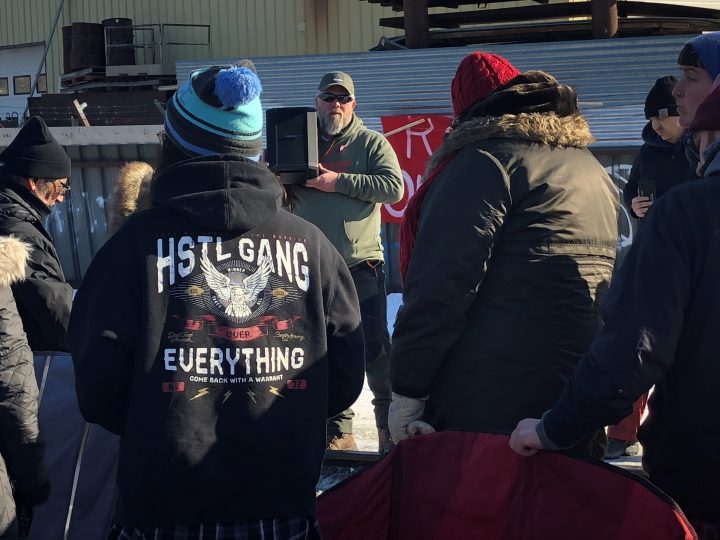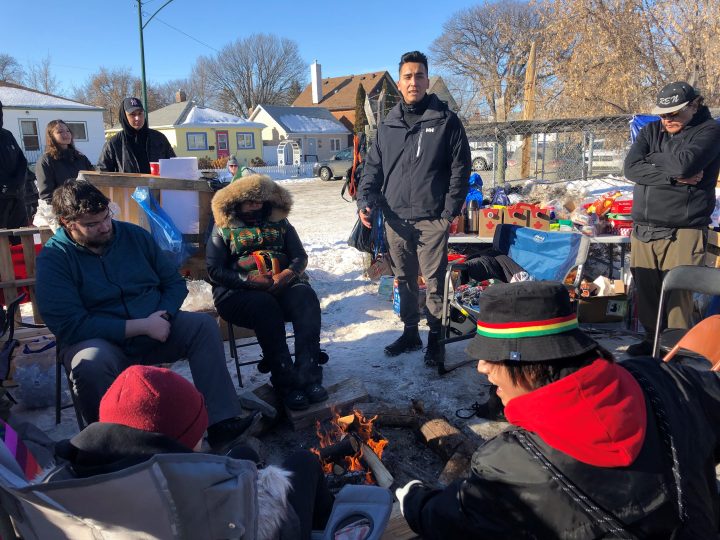A sitting senator joined and a political candidate from a controversial party joined Saskatoon Wet’suwet’en demonstrators on Sunday.

It was the second day the demonstrators had camped on the CP Rail tracks that cross through Saskatoon to show support for the hereditary chiefs against the LNG Coastal GasLink pipeline and the third day since Prime Minister Justin Trudeau called for blockades across the country to be taken down.
Lillian Dyck, a non-affiliated senator, and Mark Friesen, a candidate for the People’s Party of Canada (PPC) in the 2019 election, both visited the camp, located on CP Rail property between 21st Street and 22nd Street.
“I’m here to support them. I believe they have a just cause,” said Dyck, who was appointed by then-Prime Minister Paul Martin in 2005.
- Canadian immigration officers investigating hundreds identified by extortion task force
- Ottawa expects Ukrainian emergency visa holders to return after war ends
- As new EV rebate program starts, car dealers still seek past reimbursements
- China drops visa requirement for Canadian tourists, business visitors
“This is about … protecting the rights of the people to live the lives they should be able to live if it were not for the federal government and all the colonial practices.”
Friesen, who unsuccessfully ran for the PPC in the last election, used a speaker to play what he said was a recorded interview with an Indigenous elder in B.C. The interviewee spoke in favour of the proposed LNG Coastal GasLink pipeline through Wet’suwet’en traditional territory and against the demonstrators.
Twenty Wet’suwet’en band councils, which are elected, signed agreements with Coastal GasLink to build a natural gas pipeline through their territory. But the hereditary chiefs, whose authority over the use of traditional land was upheld in a 1997 Supreme Court ruling, have resisted the pipeline.

Get breaking National news
Demonstrators have erected blockades across the country in support of the hereditary chiefs and against RCMP, who tried to remove people blocking construction in B.C.
As Friesen was leaving after the recording ended, Andre Bear rebutted his arguments to the other demonstrators.
“Who is going to speak for the land? Because obviously a lot of our chiefs and our leaders aren’t doing that today,” the University of Saskatchewan law student told the roughly two dozen people.
“There are a lot of young people that know for a fact that, regardless of all of the money in the world, we need to ensure a certain future for our children and grandchildren,” he told reporters afterward.
Neither Bear, Friesen nor Dyck were at the camp, located on rail property but not on the tracks, the whole day.
Greg Prior arrived at approximately noon on Friday and was one of four people who stayed overnight. He had joined the camp, he said, “to honour the missing and murdered Indigenous women and everything that the pipeline brings to that territory.”
Nancy Greyeyes, another demonstrator, said the protests weren’t just about the land and water that would be damaged during the construction of a pipeline — and could be damaged further if the pipeline ruptures.
“Every time there’s a man camp, the numbers of missing and murdered Indigenous women rises drastically,” she said.
“Our goal is to make sure that people are aware that our communities have been suffering for hundreds of years under colonialism and that a little bit of disruption is something very peaceful,” said Erica Violet Lee, an organizer.
Lee said the demonstrators would remain as long as it takes to stop the pipeline.
— With files from the Canadian Press.










Comments
Want to discuss? Please read our Commenting Policy first.